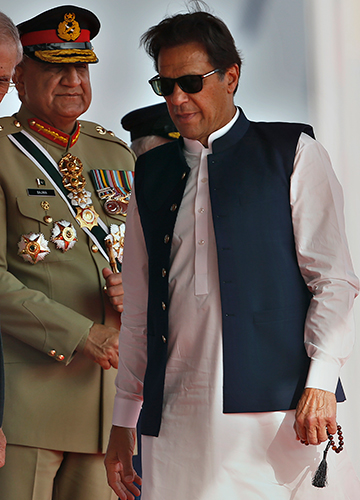Well before Imran Khan was Pakistan’s prime minister, he was a paradox. For those of us who knew him—in my case as a professional journalist who has reported on and from Pakistan for decades—it was hard to reconcile the seemingly disparate parts.
Who is the real Imran Khan?
Is he “Im the Dim” as author Salman Rushdie disparagingly referenced him to describe his flamboyant Casanova years as a playboy pin-up who lived the superficial life? Or, is he the instinctively canny craftsman with an instinct for survival honed from his years as a cricketing superstar?
Before he became prime minister of Pakistan, Khan would often point out that there was no Pakistani politician who knew India as well as he did, both in the number of times he had visited as a private citizen and in the number of close friends he had here. His implication was that his rise would automatically translate into a strengthening of India-Pakistan relations.
On his last trip to India—he was still an opposition politician then—I met him for a cup of coffee at a Delhi hotel. He was an easy-going, laid-back and charming, charismatic global citizen who seemed utterly at ease in his own skin, happily posing for selfies with a legion of fans. I presented him with a copy of my first book on India. Since then, he has repeatedly quoted from it in his campaign rallies zooming in on one paragraph where I speak about a back-channel, off-record, unofficial meeting between Prime Minister Narendra Modi and then Pakistan prime minister, Nawaz Sharif.
On that Delhi trip, Khan believed his time had come. He was upbeat and optimistic, and smiled ear to ear at whatever was asked of him.
A couple of years later, I met Khan in Islamabad as part of a group of journalists in Pakistan to report on the opening of the Kartarpur Sahib Gurdwara. He had achieved his stated goal; he was now prime minister of Pakistan.
But this time Khan seemed unfriendly, awkward and uncomfortable, barely acknowledging that he had known some of us in the group for more than 20 years. I walked away thinking that the Pakistani deep state’s eye on him was a scrutiny that he could not afford to mess with. Perhaps that is why he could no longer appear to be too convivial with Indian journalists.
Hence, the irony of this moment in Pakistan’s history. Khan, widely dismissed by his critics for being a yes-man of the Pakistani military, is today openly taking on its army chief, General Qamar Javed Bajwa. The same Khan who seemed too nervous to even interact informally with Indian media is today exhorting his party colleagues: “Ghabrao mat [Don’t be afraid]”—his complacent smile giving away his awareness that he has outmanoeuvred the very system that he seemed terrorised by, to live another day.
The only thing that has remained consistent in Khan’s politics is his anti-Americanism. He lashed out at the United States when Osama bin Laden was taken out in an undercover military operation from Abbottabad. And today, he is accusing them of being a moving force behind the move to oust him from office.
Of course, Khan is not playing by the rules. If he had not ducked the vote of confidence, he had clearly lost his majority in the Pakistan assembly. The president who endorsed his call to dissolve the assembly and go in for fresh elections is an erstwhile member of his party. Khan has pushed his country into a constitutional crisis, which led scholar Ayesha Siddiqa to describe him as a man “who never plays politics; he only plays narratives”.
Also read
- How Imran Khan may benefit from the crisis in Pakistan
- Masterstroke or civilian coup? Imran Khan’s move divides Pakistan
- Imran Khan being punished for standing up for Pakistan: Former aide
- Why Pakistan wants peace with India
- Shehbaz Sharif, the top choice to replace Imran, steps out of his brother’s shadow
But the more intriguing question is this: How did Khan emerge as the unlikely rebel against the all-powerful Pakistani military that has ensured that no civilian prime minister has ever completed a full term in office? Is it because a section of the military is in fact backing him covertly? Let us remember that Sharif’s simple assertion that the Pakistani prime minister is the boss of the Pakistani army chief, ensured that his term in government was doomed from the first day. Would Khan dare to destabilise his country’s polity without a nod from some powerful factions within the establishment?
In other words, the most important question to ask right now is this: Does Imran Khan’s effective political coup also mean a coup of sorts within the Pakistani military? And, is the Pakistani Army’s Corps Commander in Peshawar, Lieutenant General Faiz Hameed—whom Khan wanted to continue as ISI chief—the linchpin of this plan?
Pakistani friends argue against this theory. They say that the military in the end is institutionally governed and its chief will have the last word. They say Khan has shown himself to be a poor loser who is trying to cheat after losing the game.
Khan would possibly argue that he is fighting for survival in a country where martial law has ended but democracy still has to take deep roots.


